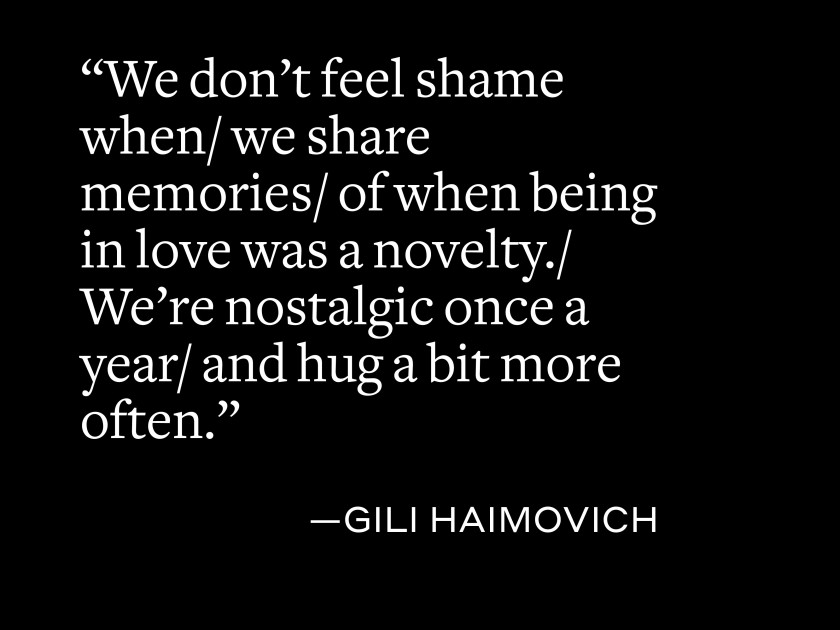
These poems are part of an ongoing series that we are sharing from Israeli authors and authors in Israel.
It is critical to understand history not just through the books that will be written later, but also through the first-hand testimonies and real-time accounting of events as they occur. At Jewish Book Council, we understand the value of these written testimonials and of sharing these individual experiences. It’s more important now than ever to give space to these voices and narratives.
In collaboration with the Jewish Book Council, JBI is recording writers’ first-hand accounts, as shared with and published by JBC, to increase the accessibility of these accounts for individuals who are blind, have low vision or are print disabled.
Diasporic Nostalgia
We don’t feel shame when
we share memories
of when being in love was a novelty.
We’re nostalgic once a year
and hug a bit more often.
When we do reminisce
it’s not due to our deserted country
but because of the calendar
showing us one of our anniversaries.
Recently we started to hug a bit more frequently
and it is because of our frantic deserted country.
We love like we forgot it ever had a beginning.
and we continue to love like it will have no end.
We acknowledge eventually we’ll die
and discuss, almost negotiate,
how many marks we want to leave behind us.
We’re sick and merry, healthy and sad, we’re sad and sick and merry and married.
Yes, we do like better
who we are
but not enough
not to the degree we’d want you to stare at it.
Bone Marrow
How suffering softens the bones,
dissolves them into the night,
spreads out.
The torn skies drip ghastliness.
No horizon to shelter us
to seal, conceal
under a wide enough
palm
that won’t rip me away from myself,
from the child in the Gaza Envelope,
who is so very, very much almost my
self
my
flesh and blood.
Bones are so very soft now,
they can crumble so easily now,
be amputated from cartilages
be dragged to who the hell knows where
in Gaza.
So easy to forget them,
to forget us,
who have shelter to run to,
who have Tel
Aviv,
a mound of
spring
as it means in Hebrew,
daughters
who can still be hugged
and are alive.
The views and opinions expressed above are those of the author, based on their observations and experiences.
Support the work of Jewish Book Council and become a member today.
Gili Haimovich, is an Israeli Canadian poet writing bilingually in Hebrew and English. She was awarded prizes for best foreign poet at the international Italian poetry competitions I colori dell’anima (2020) and Ossi di Seppia (2019), a prize at the Proves Hong Kong International Poetry Contest (2017), a grant for excellency by The Ministry of Culture of Israel (2015), and more. She is the author of four books in English including Promised Lands (Finishing Line Press, 2020, US), as well as a multilingual book of her poem Note, (El nido del fénix, 2019, Mexico). In Israel she has published seven volumes of Hebrew, her recent one, Experiments in Parting is coming out these days. Her poems are translated into 34 languages and published worldwide in numerous anthologies and journals such as: The Best Asian Poetry Anthology, World Literature Today, 101 Jewish Poems for the Third Millennium, New Voices: Contemporary Writers Confronting the Holocaust and A World Anthology of Border Poetry. In Israel her writing is widely published in major publications such as The Most Beautiful Poems in Hebrew – A Hundred Years of Israeli Poetry and A Naked Queen – An Anthology of Israeli Social Protest Poetry. As a poetry translator and editor, she was the first to bring Estonian poetry books into Hebrew, for which she received recognition from the Estonian Ministry of Foreign Affairs for her contribution and distribution of Estonian culture (2022). Gili is a graduate of the Create Institute, The international school for interdisciplinary studies and the art school Camera Obscura and engages also with visual art, editing and teaching writing from an interdisciplinary approach.